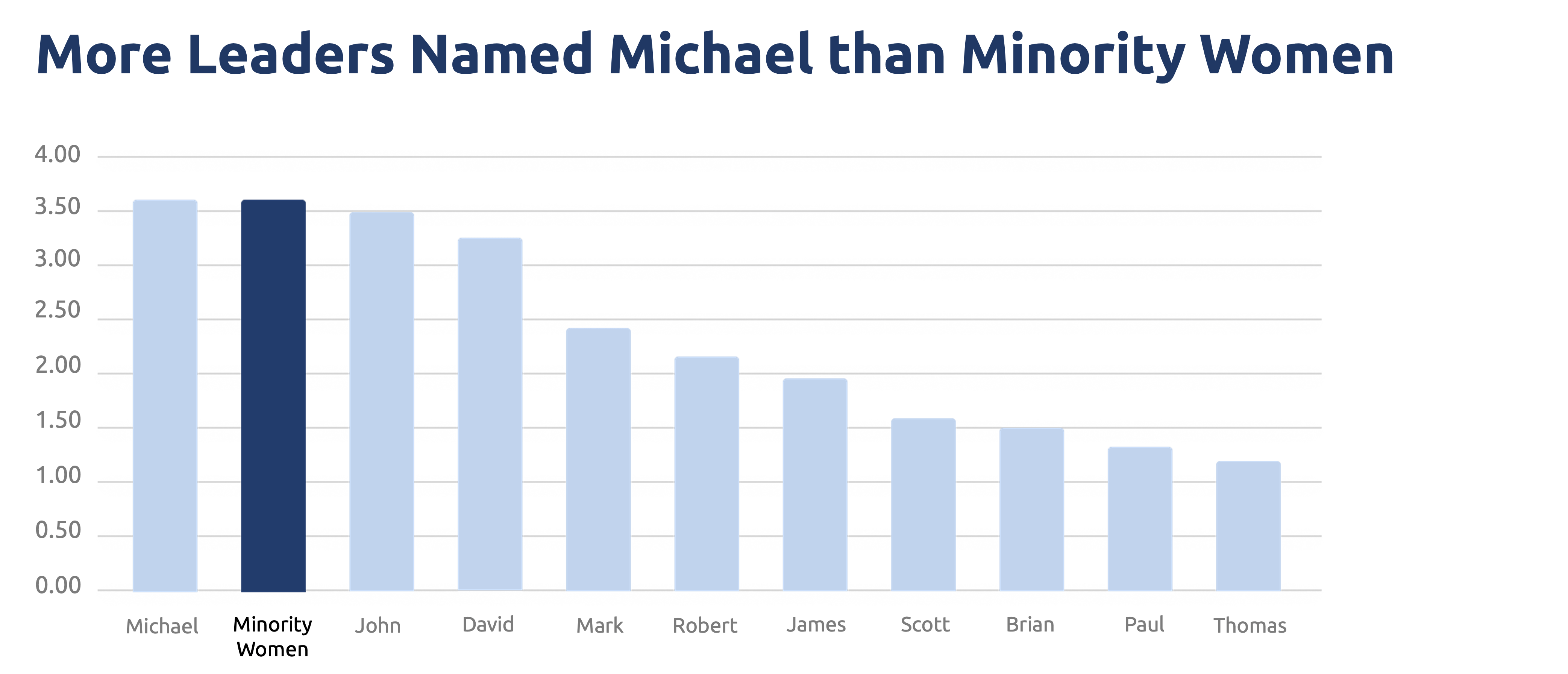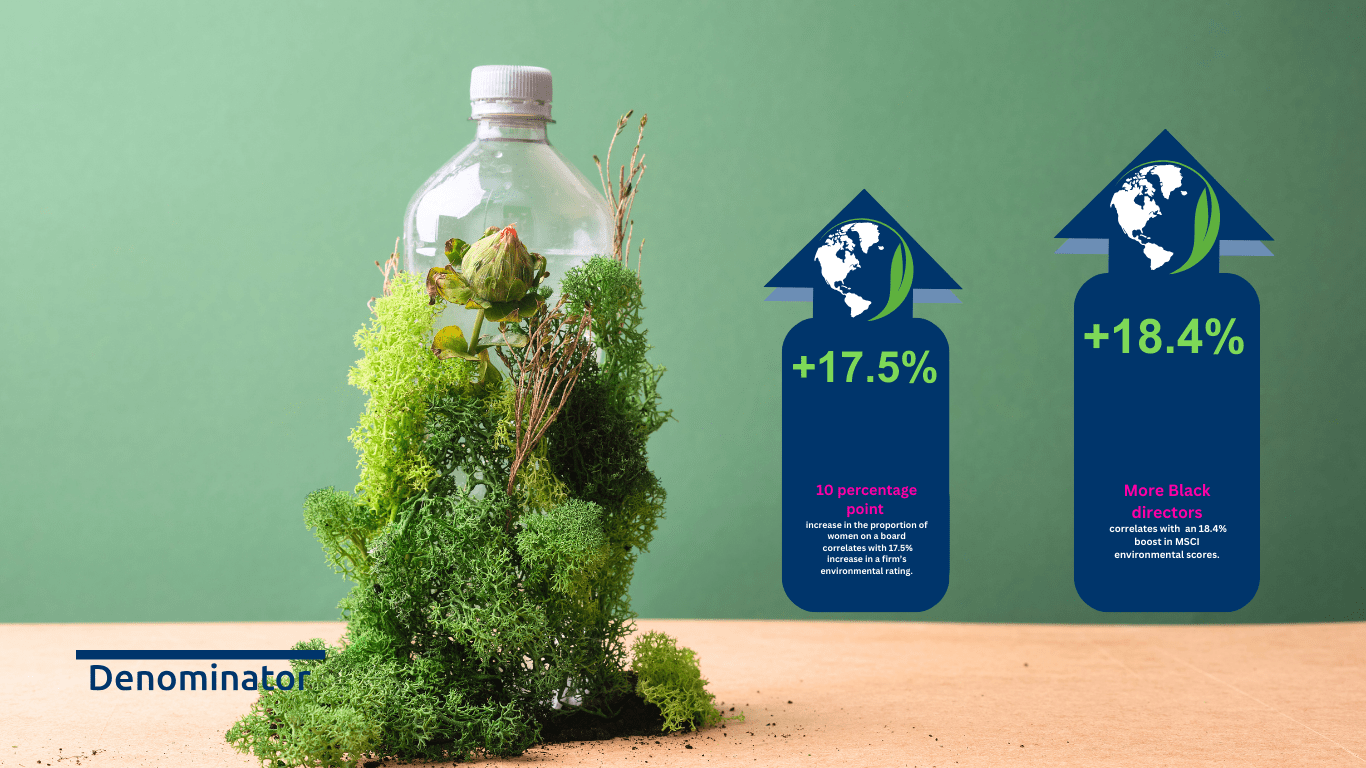In recent years, there has been an increase in the number of sustainability rankings assessing the different aspects of sustainability. While valuable, almost all tend to place their focus on the environmental aspect of sustainability. Since 2005, Corporate Knights have ranked the world’s 100 most sustainable companies and their ranking is used for this article as the methodology, indicators and weights are publicly available. Their performance indicators and weights have changed over the years, and it has been positive to see the expansion of social performance indicators, such as gender and racial ratio on both executives and board plus a supplier score. Still these social indicators only weigh 20% of the overall sustainability score. The remaining are indicators of “cleanness” making this ranking mostly a “green” rank focusing on the environmental aspect of sustainability.
As sustainability goes beyond environmental performance, Denominator conducted an analysis showing how the cleanest companies perform exclusively on the social aspect, by including additional DEI-dimensions on top of gender and race/ethnicity and making it 100% of the weight. This was done by analyzing the 100 companies from Corporate Knights’ rank with Denominator’s Diversity, Equity, & Inclusion (DEI) Score.
The results reveal that there is almost no correlation between the two rankings, meaning that the cleanest companies are not the ones performing best on DEI and vice versa. This finding suggest that the green and social aspects should be analyzed separately as they rank companies differently. If the ESG aggregated acronym is to be kept many of the existing sustainability rakings or ESG scores would need to better incorporate and calibrate to the social aspect. Sustainability is about both people and planet.
Sustainability has become a hot topic for policymakers, businesses, investors, and society in general. At the same time, many disagree about what sustainability entails. What should be included in a sustainability measure?
In recent years, ESG has become a fundamental part of how corporations are rated on sustainability. However, many ratings largely focus on the Environmental part and less on the Social and Governance aspects. At Denominator, we believe it is time to revisit this focus. Sustainability is about both people and planet. It is more than just the “E”, and as a consequence both the “S” and “G” needs to be prioritized when ranking companies form an overall sustainability perspective. Environmentally friendly companies do not necessarily do well on Diversity, Equity, & Inclusion (DEI) and vice versa.
Since 2005, Corporate Knights has ranked the world’s 100 most sustainable corporations based on an assessment of 7,000 public companies with revenue over US$1 billion. The rank is based on an index, including 23 key performance indicators of which 50% of the overall score is based on Clean Revenue and Clean Investment. 30% is based on productivities for energy, carbon, waste, water, and other financial key numbers and the remaining 20% is based on key performance indicators related to the social aspect.
Since the beginning, Corporate Knights has considered gender ratio on executives and board members and in 2021, racial diversity was added. The rating also considers Sustainability Pay Link, Supplier Score, and Paid Sick Leave. While these are good performance indicators of the social aspect, it is not enough to understand a company’s diversity, let alone performance on DEI. To do this, a broader perspective, and a holistic approach is needed.
What is Diversity, Equity, & Inclusion?
Diversity, Equity, & Inclusion (DEI) is an integrated part of the social aspect of ESG. Many studies show that corporations with higher degrees of DEI outperform their peers as they benefit from cognitive diversity, higher productivity, better employee retention, and an overall boost in morale.
Diversity refers to an embodiment of a particular group’s composition and includes people’s background, personality, life experiences, and beliefs – all the things that make us who we are. It is the combination of our differences that shapes our perspective of the world and our approach. Diversity can take various forms and is about recognizing, respecting, and valuing differences based on Gender, Generation, Culture/Heritage, LGBTQ+, Ability/Wellness, Religion, and other dimensions.
Equity speaks to the ability to create fair access, chances, and opportunities for all the people that work for a company, in an industry, or live in a country. It is based on the notion that people are diverse, hence they need different accommodation to participate on equal terms in their daily lives.
Inclusion aims at identifying barriers of entry for certain groups and promote organizational activities that foster a tolerant and including environment for everyone. This pillar speaks to the need for ensuring that individuals have room to thrive and that cultural as well as physical diversity is welcomed and tolerated. Inclusion also focuses on engaging individuals in the decision-making process and makes it possible for individuals to be involved in their community.
Denominator’s holistic approach to DEI
Denominator has created the largest standardized database for DEI covering more than 1.5 million public and private companies in190+ countries, and 85+ industries on 650+ DEI specific data variables. While most DEI research only focus on a single or two DEI dimensions, typically gender and race. Denominator takes a holistic approach by incorporating more than 15 DEI dimensions beyond Gender and Race/Ethnicity such as Age, Sexuality, Disability, Education, Nationality, Family, Upbringing, etc. This comprehensive approach enables Denominator to measure and score on more DEI performance indicators than any other data-provider in the market and generate unique insights into this area.
Correlation between cleanness and DEI performance?
Denominator’s data and scores cover the 100 companies listed by Corporate Knights as the world’s most sustainable and the dataset was joined in a correlation analysis. The result: There is a correlation value of 0.07 between Denominator’s and Corporate Knights’ rankings, which can be considered insignificant. As the figure below shows, most of the companies place very differently on Denominator’s rank than Corporate Knights’, only a few places the same or close.
Denominator and Corporate Knights’ ranks: Insignificant correlation between companies placing

Source: Denominator; Corporate Knights
Note: The dark blue dots show Corporate Knights ranking of the world’s 100 most sustainable companies. The light blue dots show the companies ranked after Denominator’s Total DEI Score. Number 1 received the highest score.
As Denominator rate from a DEI perspective and Corporate Knights rate from a mainly environmental perspective, the analysis indicates that the greenest companies are not necessarily doing well on DEI and vice versa. For example, the highest placed company on Corporate Knights’ rank is placed number 20 on Denominator’s, and on the other hand, the highest placed company on Denominator’s rank is placed number 55 in Corporate Knights’.
Why a holistic approach is needed
Taking a closer look at the top 25 companies on Denominator’s ranking, it is clear that very few companies are placed in top 25 when only taking gender or race/ethnicity into account. The figure below illustrates how important it is to have a holistic approach. When measuring gender or race separately, some companies will receive a much higher or lower ranking than measured by the total DEI Score including more dimensions of DEI, such as performance on disability, age, education etc. Therefore, when considering companies DEI performance measuring only gender and race/ethnicity can show misleading results.
Denominator’s Total DEI Score: Top 25 companies

Source: Denominator.
Note: Top 25 companies on Denominator’s Total DEI Score and their ranking on Total Gender and Total Race/Ethnicity.
Death of ESG – Long live the E, S, and the G!
This analysis compared the world’s 100 most sustainable companies ranked by Corporate Knights with the same companies ranked by Denominator’s Total DEI Score. It showed that the best performing companies on mainly green performance indicators did not necessarily do well on Diversity, Equity, & Inclusion and vice versa. This insight raises the question: to what extent does it makes sense to have environmental and social aspects in one rating?
It can still make sense to perform one sustainability rating, but to get a non-biased view one should then allocate equal weight to the different aspects of sustainability or alternatively just be transparent about what type of ranking it is. At Denominator we applaud Corporate Knights for their transparency, and we are open to partnering for bringing even more details to the understanding of sustainability. We need a holistic approach to sustainability. And we need a holistic approach to DEI.



